International Students Learn Russian Through Theatre Performance
International students at HSE University acted in and shot a film-play in Russian as part of the ‘Russian through Drama’ course. The students spent a semester preparing the play, immersing themselves in the Russian language and cultural environment. The HSE News Service spoke with the instructors and students about their work on the play and their Russian studies.
Instructors and students in the Russian as a Foreign Language in Cross-Linguistic and Cross-Cultural Perspective master’s programme served as directors and actors in the performance of The Two Maples, a play by Evgeny Schwartz. The course ‘Russian through Drama’ was developed for HSE University’s international students by Anna Leontieva and Ekaterina Schnittke, Associate Professors at the School of Linguistics, who also worked as directors and producers of the film-play.
'The Two Maples' performance
The course was offered to students of all levels, from zero to C2. Some found it harder than others, but the teachers adjusted their approach to suit everyone’s needs and worked on language difficulties with each of the students individually. The course enrolled about twice as many students as the organizers intended, but they accepted everyone: it was decided to show the performance in two casts in order to give everyone a chance to participate.
During the course, the international students not only developed their acting skills, but they also improved their language proficiency and made new friends from different countries.
The classes consisted of three parts. The first is a warm-up with voice training, theatre sketches and an introduction to grammar. This was followed by grammar training in which the teachers suggested topics that were requested by the students and developed lessons with vocabulary that was relevant for the play. The third part included readings of the play and rehearsals on stage. The instructors noted that the students were so involved that by the end of the course, they exchanged phrases and quotes from the play at the level of native speakers.
Ong Chin Quan, exchange student from Singapore
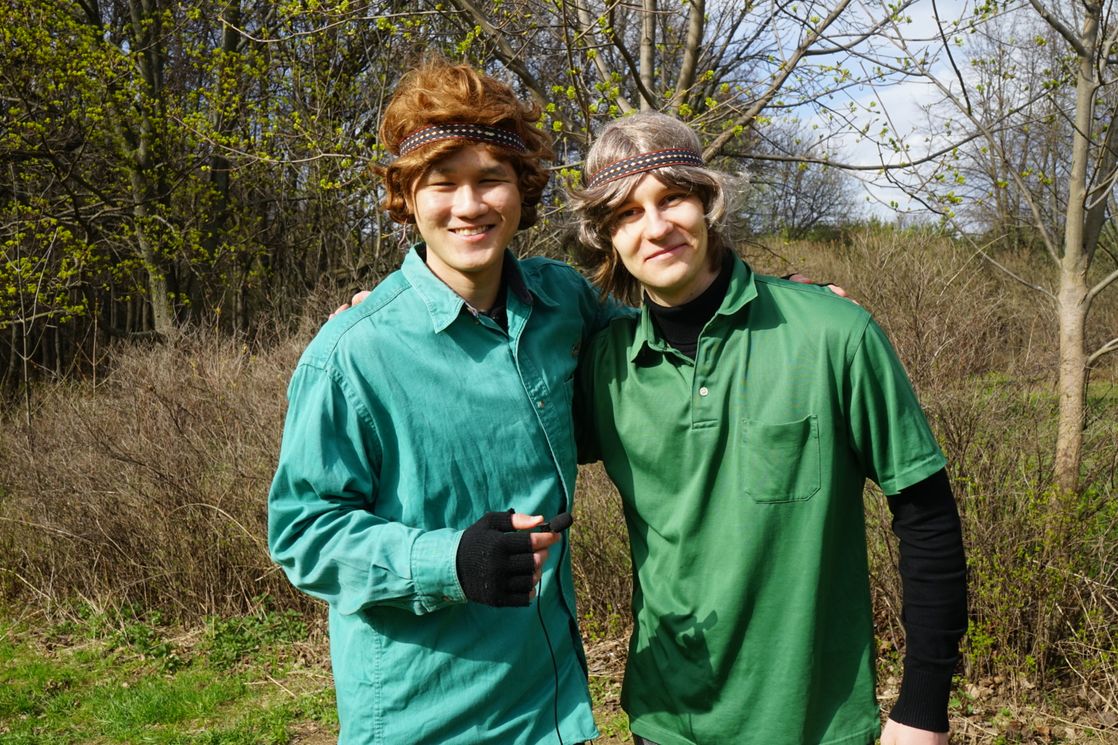
Before coming to Russia, I had learned Russian by myself, but I had never lived in a place where I would be surrounded by Russian speakers. That’s why it was hard at first: I had trouble with understanding and speaking. The course allowed me to practice my Russian.
At the beginning, we got to know the characters in the play and then read the text again and again. At first, the text seemed difficult to me, as there were a lot of words and expressions I hadn’t known. But eventually, it became easier to understand the play. The teachers were patient; they talked clearly and slowly, so that we, as foreign students of this melodic but complicated language, would understand everything. At the same time, we studied a lot of grammar.
In this process, I was able to better feel the Russian soul and the Russian language by means of getting to know the Russian fairy tales and literary styles
I am not afraid of speaking Russian. It may be difficult to find words sometimes, but I decided to speak Russian with others as much as possible, even if I sound strange. When I travelled across Russia, many people didn’t speak English, and I had to talk to them in Russian. I understood that I had to leave my comfort zone and not be afraid to make mistakes, but to learn from these mistakes. I decided to let it go and just keep trying.
I played brothers Fyodor and Yegorushka in the performance. The evil Baba Yaga turned them into maple trees. I found something close to my characters in myself: sometimes, due to my mistakes or occasional misfortunes I feel helpless and desperate. And I feel I have to call for help. I believe many of us feel like this from time to time. But misfortunes are not forever, and in the end, the sun will rise and shine after the storm, and everything will end happily.
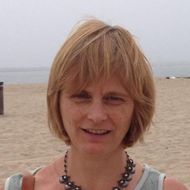
Ekaterina Schnittke, Associate Professor at the HSE School of Linguistics
We chose The Two Maples by Evgeny Schwartz for two reasons. First, because he is a brilliant author, and second, because it is a rather simple play. It is themed on folk fairy tales and is modern at the same time. It is full of humour and unexpected moves. This is exactly what we needed: to show the traditions and make them comprehensible, not only to study folklore, but to make fun of it, to feel it as something out of time.
In the middle of the course, many students had to leave the country, and we even suggested closing the project. But our actors didn’t agree: they found friends who replaced the departing students, and the production happened.
Paola Cristina Comina, third-year student of international relations at the Faculty of World Economy and International Affairs from Ecuador
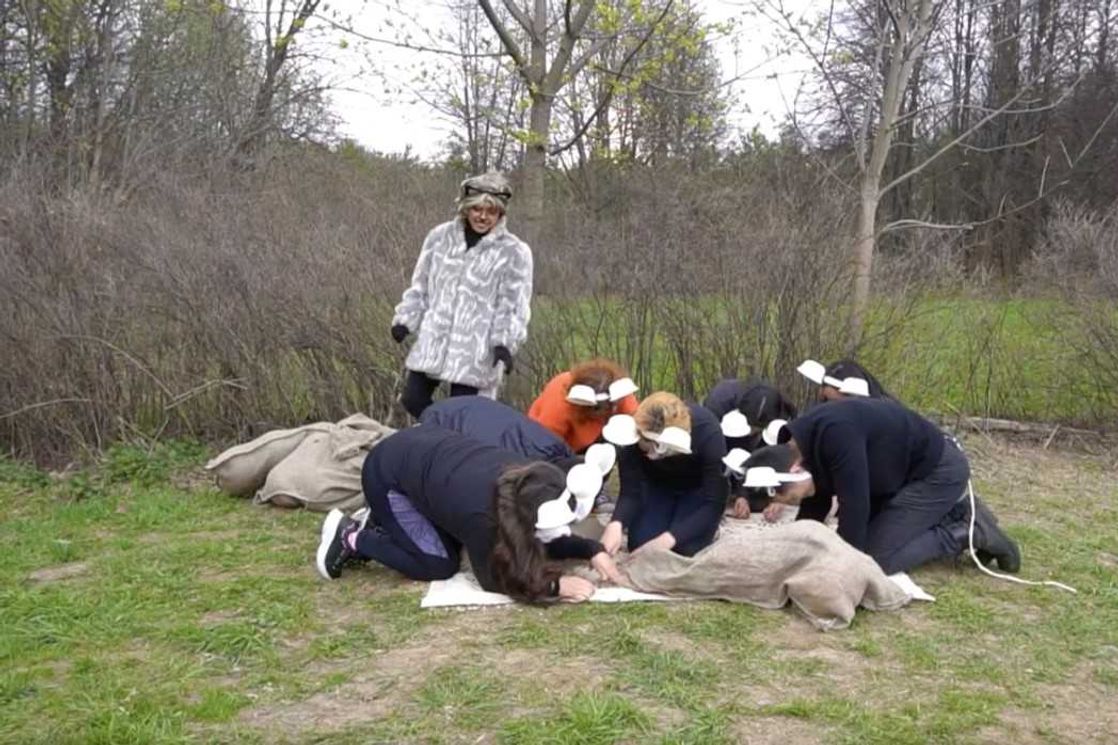
When I saw the publication about the project, I was really caught by it. I've always been interested in theatre, and the fact that the project was for international students who wanted to improve their Russian language skills blew my mind! As a third-year student who is still struggling with Russian, I was happy to know that there are teachers who are worried about us and trying to develop our skills. What I liked the most was that you can learn Russian in a non-conventional way.
This practical method increased my confidence to speak out loud. I used to be shy and most of the time didn’t want to speak unless it was necessary. But now I feel free to talk even though I could make some mistakes
At the beginning, the course was challenging. I don't have a good memory, and remembering all those lines made me nervous, but as soon as I started to rehearse, read, and practice, I noticed that it wasn't that hard after all.
I played a cat—Kotofey Ivanovich—and I love it. I am crazy about cats, and when I knew that Kotofey hadn’t been chosen by anyone yet, unbelievably, I asked to take him. I always wanted to play a cat, they are so cute, smart and lovely, and they are classy, so I was ready to fit in the character to make it as real as possible.
This course has definitely helped me a lot, and not only with my Russian skills. I have met nice people and friends. I hope that this course will last for a long time.
Thais Micaela Panimbosa, student at the Faculty of World Economy and International Affairs from Ecuador
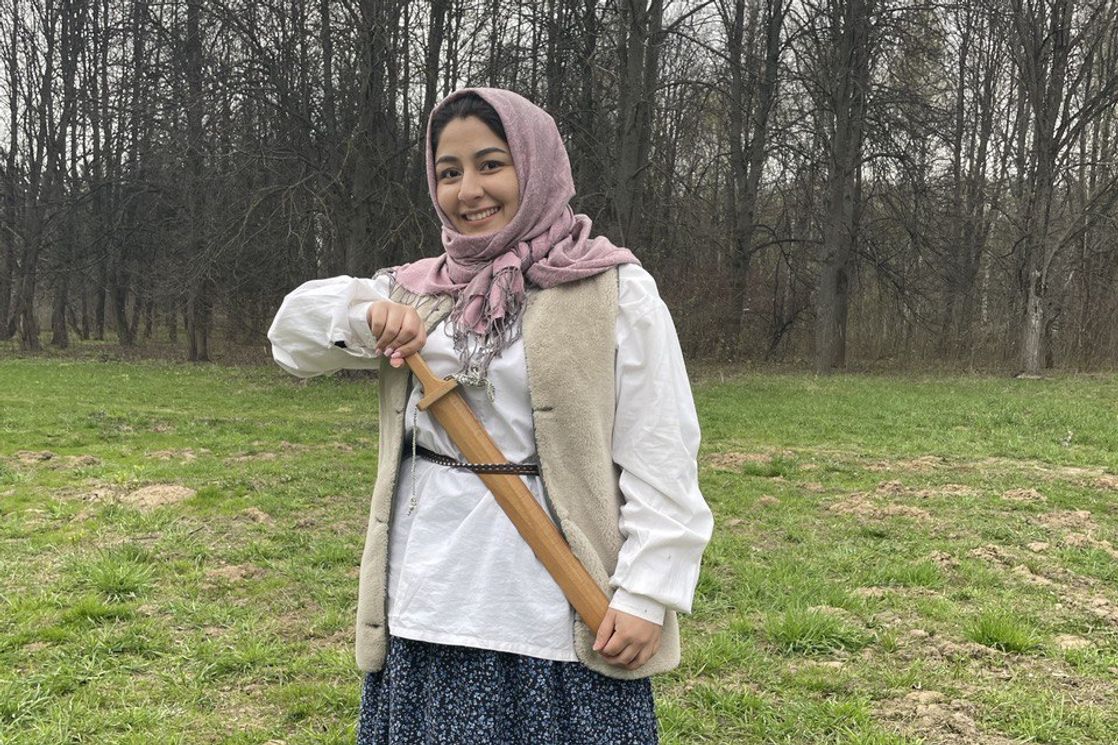
I never imagined that studying a language would be so fun! The Russian language is rather complicated, although it’s very interesting. The language of a region expresses and contains the history, culture and tradition of its people. I started studying Russian three years ago, but I believe that we never end our study of a new language. Participating in our piece of theatre at the beginning was a big challenge, but with practice and several reviews and performances, we managed to improve our pronunciation, grammar and even expressiveness for the theatre. Not to mention that during this process we made many new friends with whom also spoke Russian, then the practice became more natural and spontaneous.
As a learning method I consider theatre to have been one of the best tools for my progress in the Russian language
We were afraid to speak Russian at the beginning. Many of us had never acted before. The idea that many people would see the film when it is finished was also scary, but I think in the end a good result was achieved and we managed to get past our fear of the camera and the language.
I can say that I really liked the character that I played. To begin with the point that Vasilisa is very popular and well known in Russia, I would dare to say that this is part of the Russian literary tradition, so playing the role of Vasilisa was both a responsibility and an honor, although in our theatre this role is shared between three people because it was quite extensive. I think that my closeness to the character could be related to the fact that she is quite persevering because she decided to face Baba Yaga to find her children and was also very obedient to complete all the tasks that Baba Yaga assigned her. I was surprised that she was a very strong character, calm but strong because she always knew how to act and did not lose patience. In general, this act has been an opportunity to develop and test our ability in the Russian language, and it has also allowed us to discover a beautiful art that is theatre and how to express ourselves and develop through a new character.
Mishell Sarzosa, third-year student of international relations at the Faculty of World Economy and International Affairs from Ecuador
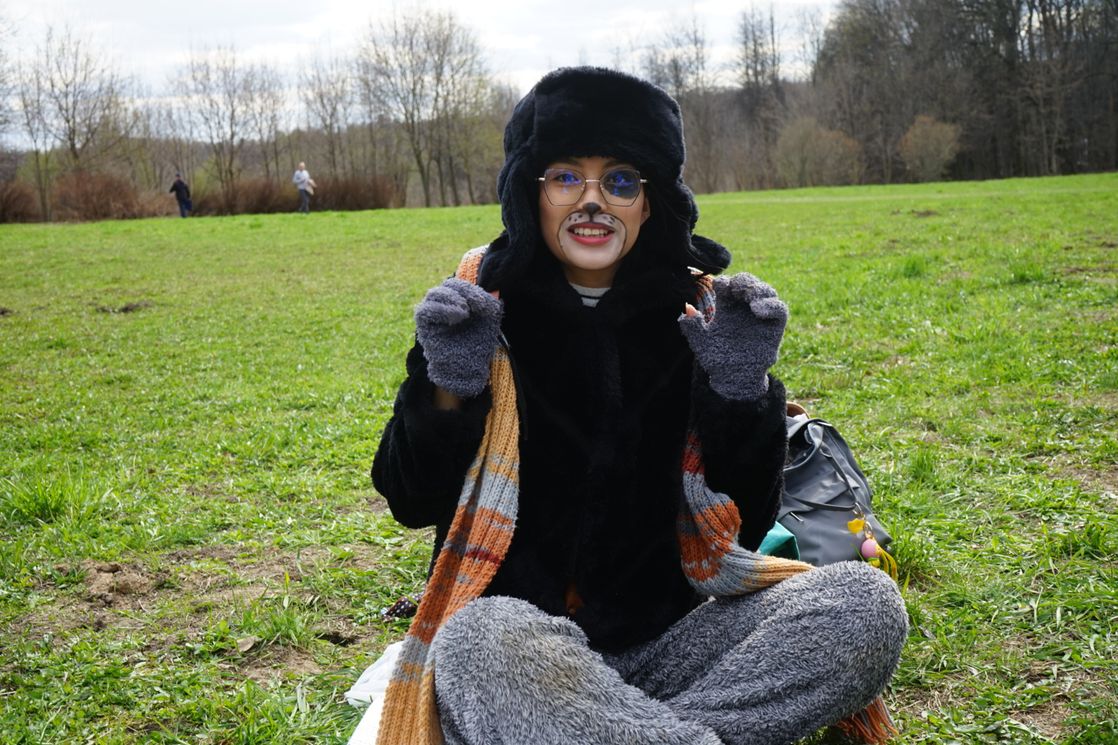
I had the opportunity to participate in the theatre play because a close friend told me that it was very fun and interesting and that I could make more friends and learn Russian This is why I decided to try to participate in the theatre class. Even though I entered the theatre class a little late, I could see that everyone was very good friends and had a lot of fun playing their role. Their level of Russian had improved and that was what surprised me the most.
The classes I attended were outstanding because the teacher had a different technique than the conventional teachers. She was very patient and assertive with her words, always had a smile on her face and helped us and corrected our Russian. On the other hand, I was afraid to speak Russian in front of others, but with the passing of time and the help of others I could be more confident and not be afraid to make a mistake.
My character was Sharik, a dog who was faithful to his owner and accompanied him at all times. I think I identify a little with him because I like to help others and always try to give the best of me. Without a doubt I would participate again in another play!
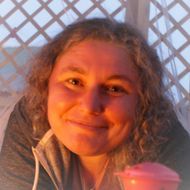
Anna Leontieva, Associate Professor at the School of Linguistics
It was the first time we launched such an experimental course. We had known that theatre practice of language learning existed and worked well. That’s why we decided to go on a kind of venture and try it. We love theatre, and we love new approaches. And the result exceeded our expectations.
Anna Leontieva
Associate Professor, School of Linguistics
Ekaterina Schnittke
Associate Professor, School of Linguistics
See also:
Maths Club, Russian Phonetics, and the Most Delicious Milk: Prep Year Kicks Off
In October 2025, more than 200 international students began their studies on HSE University’s International Preparatory Year. After a month of rigorous in-class learning, they gathered for a more informal event—the Russian Speaking Club—where they met classmates from other groups. The HSE University News Service spoke with students, teachers, and administrators about the programme’s progress and expansion.
‘This Meeting Will Mark the Beginning of Our Fruitful Cooperation’
An HSE University delegation led by Rector Nikita Anisimov met with Ambassador Extraordinary and Plenipotentiary of Singapore to Russia Néo Ek Beng Mark at the HSE campus on Pokrovsky Bulvar. The parties discussed opportunities for expanding cooperation and promising areas of partnership.
‘I Will Soon Build the Confidence to Express Myself Well’
Learning Russian is one of the challenges international students face when they come to Russia. HSE University helps them not only with Russian classes, but with informal events such as the Russian Speaking Club, where they can absorb the language in a relaxed and non-competitive setting. The HSE News Service talked to the organisers and participants of the club about their impressions of the first meeting and plans for the future.
A Shadow Play Performed by Students to Premiere at HSE School of Design
On March 16, first-year students of the ‘Event Design. Theatre. Performance’ programme at the HSE Art and Design School will perform a shadow play entitled 'Don't Seek Summer in Winter.' The premiere performance and the preceding event are based on a Slovak folk legend and Samuel Marshak's fairy tale 'The Twelve Months.' The performers will guide the audience through the four seasons, allowing viewers to experience all twelve months at once, like the main character in the fairy tale, and to discover light amidst the all-encompassing darkness. The event is open to anyone interested, but registration is required.
‘Everyone Quickly Engaged in Conversations and Demonstrated Their Creative Thinking’
The online Russian Speaking Club opened only a month ago, but has seen a rapid growth in the number of participants. Every week, the club holds free online meetings where participants and a Russian language tutor discuss various topics related to the Russian language and culture. Below, the club leaders share their impressions and plans, which include going offline.
Russian Speaking Club: Practicing the Language and Meeting New Friends
For HSE Preparatory Year students, the Russian Speaking Club is a way to improve their language proficiency in a relaxed atmosphere. At this year’s first such event, they discussed online communications and social media. Michael Dzodzoe from Ghana and Leen Sabbagh from Syria shared their impressions with the HSE News Service.
‘My Prep Year Experience Has Been Phenomenal; I Would Repeat It All over Again if I Could’
The International Preparatory Year programme held its graduation ceremony in July. This academic year, 125 students from 50 countries were enrolled in the programme. They will continue their studies at Russian universities, most of them pursuing bachelor's and master's programmes at HSE University. The graduation was organised as a quest, where the students were able to demonstrate their achievements in learning the Russian language. Graduates from Ecuador, Syria, and Mexico shared their impressions with the HSE News Service, Deputy Director Polina Shanko talked about plans for the coming year, and mathematics teacher Vladimir Gordin gave his advice to future students.
HSE Students Support Phonetics Competition for Chinese Students
The Glinka State Conservatory in Nizhny Novgorod has held a phonetics competition in Russian as a foreign language for Chinese students of the preparatory department. The spectators, jury members, and support team of the competition included HSE University-Nizhny Novgorod students of the Bachelor’s in Foreign Languages and Intercultural Business Communication, Academic Supervisor of the programme Marianna Korenkova, and Chinese language teacher Elena Ammosova. The Chinese students opened the event with performances of famous solo works in Russian.
‘I Made a Lot of Friends and My Speaking Level Improved’
On December 23, students of the HSE Preparatory Year got together for a festive Russian speaking club. They expanded their vocabulary and cultural outlook by immersing themselves in Russian winter holiday traditions and even played the role of Ded Moroz—the Russian Santa.
Okro Soup, Bubble Tea, and Relleno: International Students Share Their New Year's Traditions
HSE University is home to international students from all over the world, many of whom will be celebrating the New Year in Russia for the first time. They shared their plans for the festive season with the HSE News Service and spoke about holiday traditions and dishes in their home countries of China, Ecuador, Pakistan, Ghana, Indonesia, Nigeria, Guatemala, and India.


